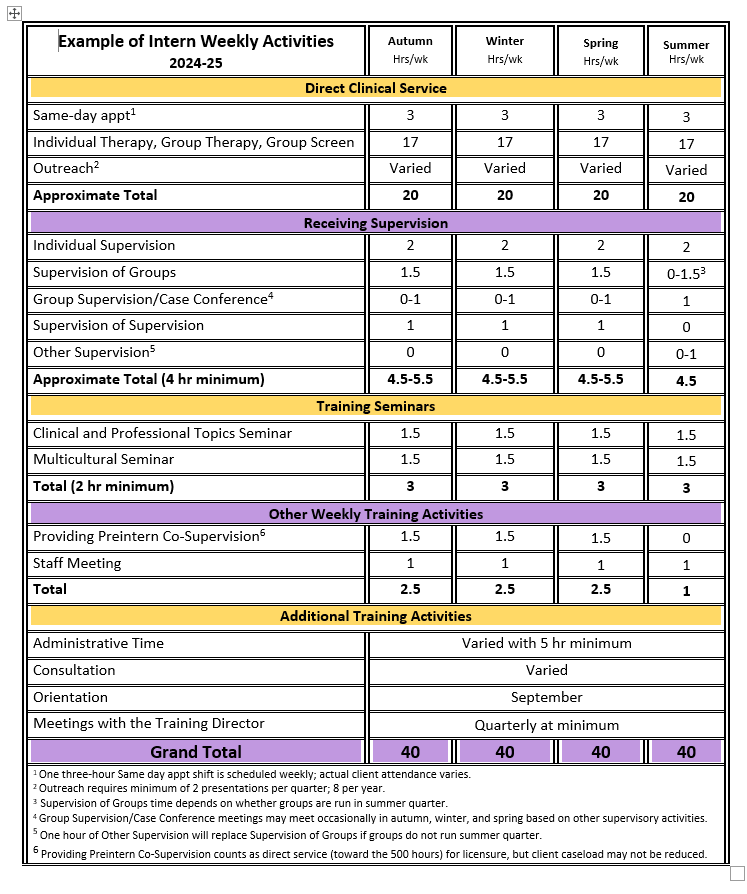Main Content
Many training activities take place outside of providing individual and group therapy and receiving supervision. Access the topics below to learn about a variety of additional ways interns spend their time.

The internship year begins with a comprehensive, structured three- to four-week orientation to the internship, during the month of September. The orientation is designed to welcome interns and begin to integrate them into Psychological & Wellness Services. Interns are introduced to the training program’s model, aims, competencies, service and training activities, administrative details, and referral sources. During orientation, each intern will complete a self-assessment which will assist in formulating training goals for the year.
The orientation program is developed and coordinated by the Training Director with input and participation from the staff. Orientation is an ongoing process, and interns are encouraged to consult with their supervisors and/or any senior staff member throughout the orientation period and the internship year.
All staff and interns attend this weekly meeting designed to communicate items of interest or concern related to Psychological & Wellness Services. Any staff member may place an item on the agenda to be discussed by emailing the Director. One common topic is how many openings each intern/clinician has to take on new clients. As Staff Meeting occurs every Wednesday morning, clinicians may wish to review their caseloads on Tuesday in preparation for this discussion.
The Training Director meets with each intern individually on a regular basis to check in about how the internship training is meeting their needs and to solicit feedback about the training program. The Training Director keeps an open door policy and interns are encouraged to meet informally and/or request additional meetings to focus on training concerns.
Time is provided for other activities such as completing clinical notes and paperwork, reviewing session recordings, case management, and completing any readings assigned for seminars.
Release time for the dissertation defense is included in interns’ benefits; interns do not take annual leave for this milestone. Professional development release time may also be available for interns to attend workshops and conferences. Some funding also may be available, but is not guaranteed. If scheduled during office hours, interns take annual leave for other academic events such as the graduation ceremony
During the interns’ same-day appointment coverage and at other times, they may be asked to consult with faculty, staff (including Student Affairs partner offices), parents, or other students concerned about a UW Tacoma student (or client). These consultations involve communicating the limits of confidentiality, actively listening to concerns, providing information about how to refer a student to PAWS or to crisis resources, sharing other area resource information, and making recommendations about how to approach difficult conversations such as referring a student for counseling services. Interns then follow up with appropriate documentation. Interns may also provide consultation to faculty, staff, or students in order to develop appropriate outreach programming to meet their needs, or to enhance PAWS services to better meet the needs of a specific population.
Seminars meet weekly starting autumn quarter, except during school breaks. Any missed seminars must be made up through readings and/or watching a recording of the seminar, at the discretion of the presenter and/or Training Director. Our seminar facilitators may come from PAWS or another office/department at UW Tacoma, from the Tacoma community, or from across the country from another university or private practice. In the latter case, Zoom is used for conducting the seminar.
Clinical and Professional Topics Seminar
This seminar meets for one and a half hours weekly throughout the year. The seminar explores various professional topics and provides training in several clinical areas. Clinical training topics may include: diagnosing and treating anxiety disorders, providing process oriented group therapy to university students, reviewing APA guidelines for clinical practice with specific populations, and preparing clients for termination. Examples of professional topics may include: presenting select outreach topics to university students, ethics and professional conduct for psychologists, preparing the CV and cover letter for jobs/post-docs, and applying for licensure. Multicultural factors will be incorporated into each presentation. Some seminars may be conducted jointly with interns from another university, either in-person or using Zoom.
Early in winter quarter, in preparation for post-internship employment interviews, interns present a formal case presentation (that includes PowerPoint) to all senior staff. This is meant to simulate the kind of experience that is typically required for university counseling center interviews. Staff provide support and constructive feedback with the hope that what is learned helps the interns land their dream job!
Multicultural Seminar
This seminar meets for one and a half hours weekly throughout the year. It focuses on various multicultural topics and promotes self-exploration and the development of cultural humility. Participants begin the year by presenting their “emerging self” which is both an introspective exercise and an introduction of themselves to the internship cohort. The presentations are designed to lay the groundwork for more culturally informed and sensitive conversations with each other re: the various multicultural topics that will be discussed throughout the year. Participants review their social identities in the context of power and privilege and, in light of this, consider any changes they want to make in how they conceptualize and respond to their clients.
For the remainder of the year, a variety of topics are explored, and may include: the multicultural orientation model, suicide prevention for LGBT youth, multicultural considerations in group therapy, consensual nonmonogamy, implicit bias, feminist therapy, and addressing weight and size stigma. Relevant movies and documentaries are also utilized for this seminar, followed by facilitated discussion.
